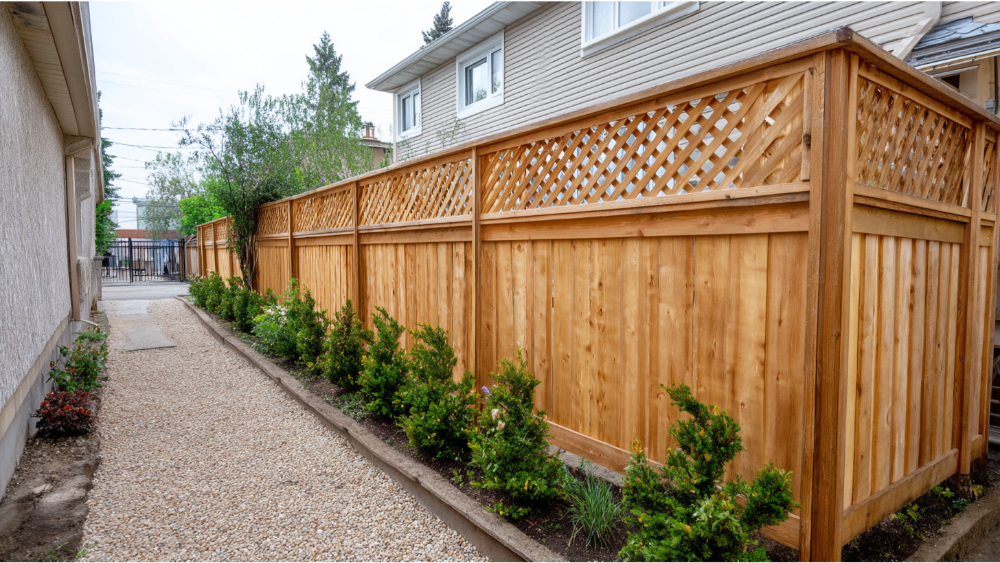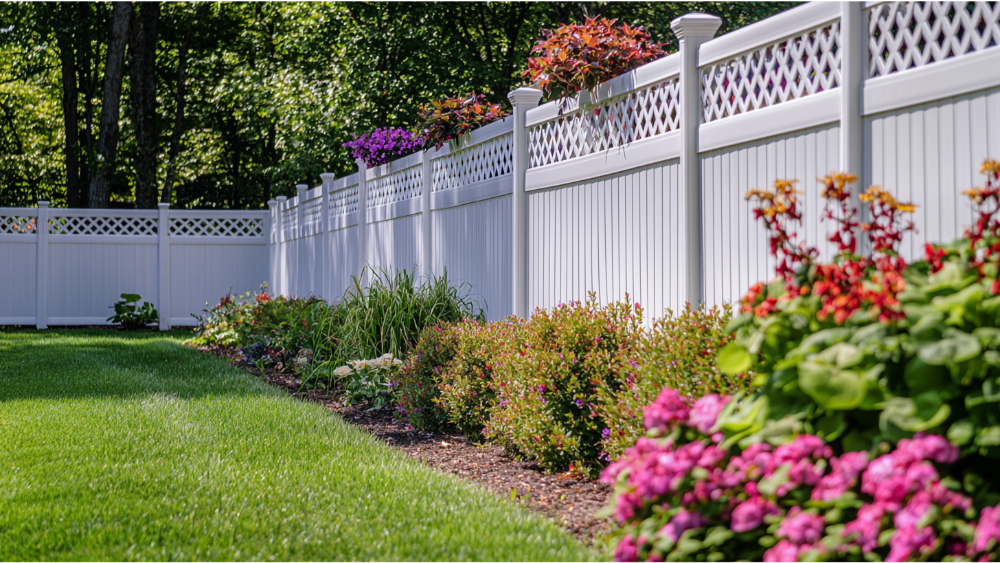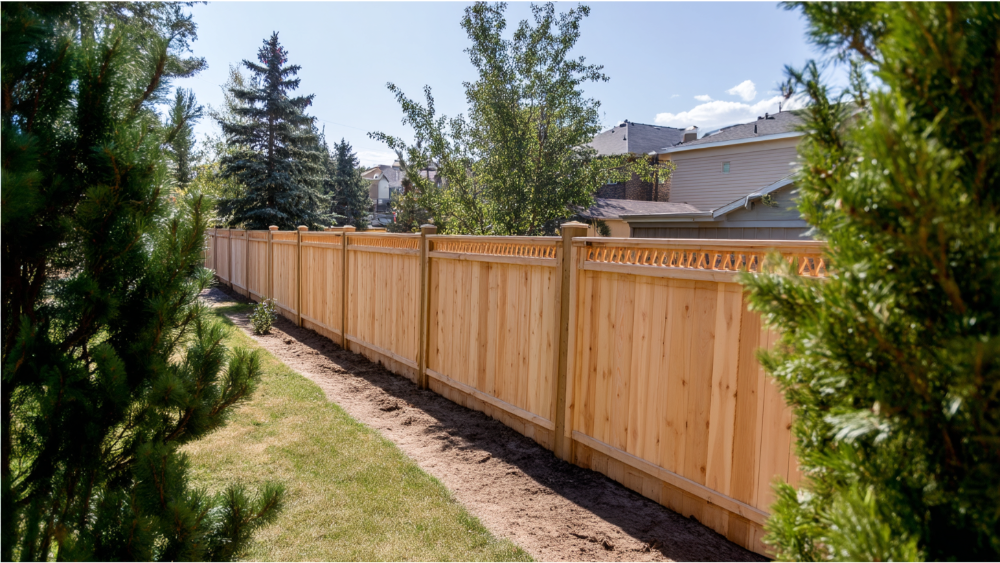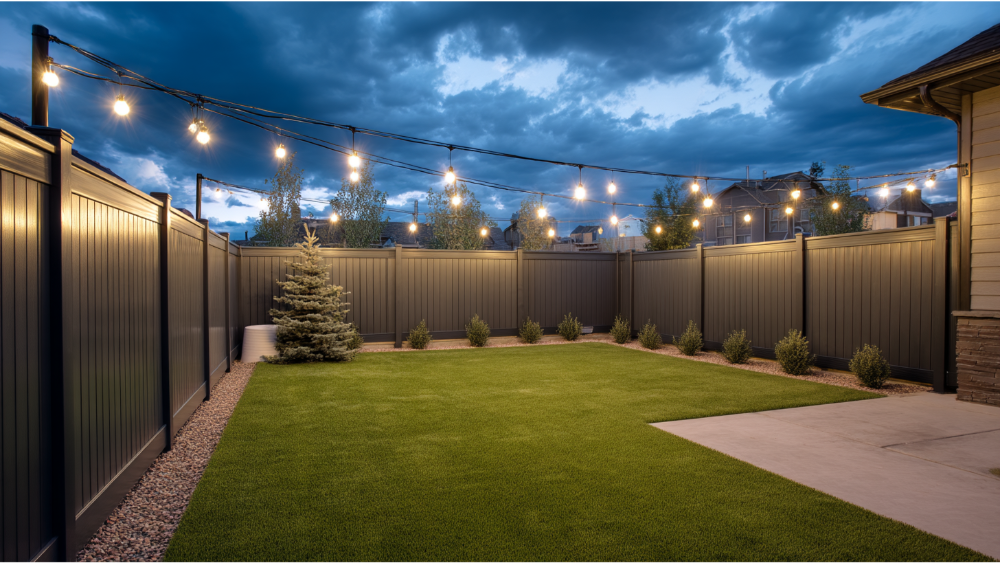Choosing the Right Fence for Your Property
When it comes to selecting the best fence material for your yard, privacy, and long-term value, many homeowners find themselves comparing a wood fence versus a vinyl fence. The wood vs vinyl fence debate has evolved significantly in recent years thanks to improvements in fencing products, better vinyl manufacturing processes, and increasing demand for low maintenance options.
At Inline Security Fence, we’ve helped countless homeowners throughout North Carolina choose the right fence for their homes. Whether you’re building a new fence or replacing an aging one, understanding how wood and vinyl fencing stack up is critical to making a smart, lasting investment. This detailed comparison will walk you through durability, installation, maintenance, cost, and customization so you can confidently choose the right fence for your needs.
Wood Fencing: Traditional, Natural, and Time-Tested

Types of Wood Fences We Install
Wood remains one of the most widely used fence types thanks to its classic look and versatility. We install a variety of wood fences tailored to different budgets and styles, including:
- Cedar: Naturally resistant to moisture and insect damage, cedar is a premium option that also smells great and holds stains well.
- Pressure-treated pine: A more cost-effective option that holds up in wet climates when properly sealed.
- Redwood and spruce: Less common but visually appealing options that add character to any yard.
Wood fences can be customized in nearly unlimited ways, including wood privacy fencing, picket fences, and horizontal designs. These fences allow homeowners to express their style with a natural material that blends beautifully with landscaping.
Pros of Wood Fencing
- Visual appeal: Nothing beats the look of natural wood. Whether left unstained or treated with a rich finish, wood offers organic beauty that synthetic materials try to emulate.
- Customizable: Paint, stain, cut, or trim wood to suit your exact design vision. Add lattice tops, decorative post caps, or custom heights.
- Biodegradable material: For eco-conscious homeowners, wood is a natural material that will eventually break down, unlike plastic-based fencing.
Cons of Wood Fencing
- Wood requires regular maintenance: Sealing, staining, and inspecting for rot or termites is necessary every 2–3 years.
- Shorter lifespan: Even with proper care, a wood fence generally lasts 10 to 20 years.
- Prone to rot and damage: Without ongoing treatment, wood can warp, splinter, or suffer insect damage.
- Maintenance cost: Homeowners can expect to spend a few hundred dollars annually to prevent rot, repaint, or replace boards.
Vinyl Fencing: Durable, Clean, and Maintenance-Free

Styles of Vinyl Fencing Available
Vinyl fencing has gained massive popularity for its sleek appearance and long-lasting performance. We offer several vinyl fence products, including:
- Vinyl privacy fence: Ideal for backyard seclusion, available in solid or decorative styles.
- Semi-privacy fence panels: Allow airflow and light while maintaining boundaries.
- Picket and ranch rail vinyl: Classic options for front yards, gardens, or rural properties.
- Vinyl wood textures: For those who love the look of natural wood, we offer vinyl wood fences that resemble wood grain and color without the upkeep.
Pros of Vinyl Fencing
- Low maintenance: Vinyl is truly a maintenance free fence. A quick spray with a garden hose keeps it looking clean.
- Longer lifespan: A vinyl fence can last 20 to 40 years with no staining, sealing, or painting required.
- Weather-resistant: Vinyl doesn’t rot, rust, or attract pests. It stays in good shape through rain, sun, and snow.
- Safe and durable: Made from polyvinyl chloride (PVC), vinyl fencing is strong, flexible, and ideal for residential use.
Cons of Vinyl Fencing
- Higher initial cost: The up-front price of a vinyl fence is typically higher than wood, especially for vinyl privacy designs.
- Less customizable: Vinyl comes in pre-formed panels, so it may not offer the same design flexibility as wood.
- Panel repair: If problems arise, damaged vinyl fence panels may require full panel replacement rather than a simple board swap.
Wood vs Vinyl Fence: Cost Comparison in 2025

Material and Installation Costs per Linear Foot
Cost is often the deciding factor for many homeowners when choosing between a wood fence and a vinyl fence. Here’s how prices compare in 2025:
- Wood fencing: $10 to $30 per linear foot for materials, plus $10 to $20 for labor, depending on the type of wood and style.
- Vinyl fencing: $20 to $50 per linear foot for materials, with labor averaging $5 to $15 due to faster installation.
A typical 150-foot privacy fence will cost between $3,000 and $7,500 for wood and $4,500 to $9,750 for vinyl, including fence installation.
Long-Term Maintenance and Costs
- Wood fencing requires regular maintenance: staining, sealing, pest control, and board replacement. Over 10 years, these long term costs can add up to $2,000 or more.
- Vinyl fencing is practically maintenance-free. You might spend $100–$200 annually on light cleaning.
When you factor in the long run, vinyl often wins in overall cost-effectiveness, especially for those who plan to stay in their home for more than 10 years.
Fence Durability and Longevity in Your Local Climate
Here in North Carolina, we see heat, humidity, rain, and the occasional freeze — all of which can affect how different fence materials hold up.
- Wood fences are vulnerable to moisture, especially if left untreated. Even cedar and pressure-treated lumber will eventually wear down if not maintained.
- Vinyl fences resist the elements. They won’t splinter, warp, or absorb moisture, making them ideal for damp conditions.
In our experience, vinyl fence systems consistently last twice as long as wood. A wood privacy fence may give you 12 to 18 years, while a vinyl privacy fence can last over 30 years.
Maintenance and Repairs: What to Expect

Caring for a Wood Fence
- Staining and sealing every 2–3 years
- Checking for soft spots, warping, or loose nails
- Trimming nearby bushes and grass to avoid moisture buildup
Wood requires more attention, but many homeowners still favor wood for its appearance and ability to be easily repaired.
Caring for a Vinyl Fence
- Rinse with a garden hose to remove dirt or pollen
- Clean stubborn spots with soap and water
- Inspect annually for cracks or broken panels
Thanks to its smooth finish, a vinyl fence doesn’t collect mildew or bugs like wood might. It also doesn’t need any painting, sealing, or staining.
Repair Considerations
- With wood, a single damaged board can usually be swapped out quickly.
- With vinyl, repairs can be more complex, particularly if an entire panel needs replacement. However, this is rare due to its durable construction.
Appearance, Privacy, and Curb Appeal
Wood Fence Appeal
- Looks warm and authentic
- Easy to customize with stain, cutouts, or trim
- Great for traditional homes and neighborhoods
Vinyl Fence Appeal
- Clean, polished look with no upkeep
- Holds color over decades without fading
- Available in wood-look styles that closely resemble wood
Both wood and vinyl offer privacy fence options that can provide more privacy for yards, patios, or pools. If your HOA requires a certain look or color, we offer compliant designs in both fence materials.
Environmental Impact and Sustainability
- Wood fencing is a biodegradable material when sourced responsibly. Using FSC-certified lumber ensures sustainability.
- Vinyl, or PVC, is made from plastic and has a more intensive manufacturing process, but its longer lifespan and recyclability help balance its environmental footprint.
Both wood and vinyl can be green when chosen and installed with sustainability in mind.
Vinyl vs Wood: Which Fence Is Right for You?
Factors to Consider
Ask yourself the following when comparing vinyl vs wood:
- How long do you plan to stay in your home?
- Are you willing to do ongoing maintenance, or would you prefer a maintenance free fence?
- Is budget more important than longevity?
Choose Wood If:
- You love the look and feel of natural wood
- You’re okay with regular maintenance
- You want maximum design freedom and favor wood customization
Choose Vinyl If:
- You want a low maintenance, durable fence
- You’re looking for a smart investment with low long term costs
- You want something that looks great year-round with minimal effort
Trust Inline Security Fence for Expert Installation
Whether you choose wood or vinyl, Inline Security Fence provides professional installation using high-quality fencing products. Our experienced team offers personalized consultations, on-time installs, and a workmanship guarantee you can count on.
We help you find vinyl fences, design custom layouts, and guide you toward the best fence material for your home, yard, and budget.
Call Today for a Free Estimate
If you’re ready to install a new fence or just exploring your options, we’re here to help. Contact Inline Security Fence for a free, no-pressure quote on wood and vinyl fencing in your area.
Frequently Asked Wood vs Vinyl Fence Questions
Which fence lasts longer, wood or vinyl?
A vinyl fence typically lasts 20 to 40 years, while a wood fence may last 10 to 20 years depending on maintenance and climate.
Is vinyl more cost effective than wood?
Vinyl has a higher initial cost, but requires little to no regular maintenance, making it cost effective over the long run.
Can vinyl fences resemble wood?
Yes, vinyl wood fences are engineered to resemble wood grain, color, and texture without the upkeep.
Is wood fencing better for the environment?
Wood fencing made from certified, sustainably harvested trees is a more biodegradable material than plastic.
What are the maintenance requirements for each?
Wood requires staining, sealing, and repairs. Vinyl fencing needs only occasional rinsing with a garden hose to stay clean.
What if a panel gets damaged?
Wood fences are easy to repair by replacing boards. For vinyl, you may need to replace an entire panel, though it’s rare.



